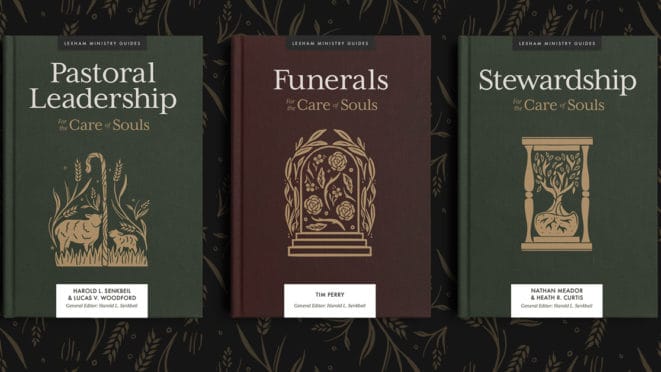Fear of death affects us all, and so pastors have significant hurdles to overcome. What Christians need today is a renewed vision of the traditional Christian funeral liturgy. In Funerals: For the Care of Souls, Tim Perry recovers the rich theology inherent to the Christian funeral: communion with the saints in death, peace in forgiveness,
Read moreRecovering the Christian Way of Death
In this excerpt from Funerals: For the Care of Souls, Tim Perry examines the dysfunctional relationship we have with death and how we can recover a Christian imagination of death. “Remember that you will die.” It was a phrase a slave was said to have whispered into the ear of a victorious Roman general as
Read morePractical Wisdom for the Care of Souls
In his preface to the brand-new Lexham Ministry Guides, Harold L. Senkbeil describes the care-filled and practical wisdom that can be found in this series. What’s old is new again. The church in ages past has focused her mission through every changing era on one unchanging, Spirit-given task: the care of souls in Jesus’ name.
Read moreWhy Is It Important to Preach on Racial Justice?
In this excerpt from the foreword to Ministers of Reconciliation, Russell Moore explains why pastors should not shy away from addressing matters of racial justice and reconciliation from the pulpit. Several years ago, reading a Baylor University Press compilation of sermons and speeches from the Jim Crow era, I was struck by one from a
Read moreGiving Greater Honor to the “Minority” in Your Midst
In this excerpt from Ministers of Reconciliation, Raymond Chang argues that a biblical view of honor serves as a helpful framework for discussing issues of race and ethnic division and unity. As a second-generation Korean American, I straddle the line between the East and the West. In my upbringing, I was told to be “American”
Read moreThink About Sermon Writing as Sculpting
In this excerpt from Small Preaching, Jonathan T. Pennington compares the process of sermon writing to the art of sculpture. A few years back, my wife and I had the opportunity to drive around the beautiful North Island of New Zealand. In addition to exploring the stunning scenery, one of our most memorable adventures was
Read moreAddressing Racism in Light of the Image of God
In this excerpt from Ministers of Reconciliation, Matthew D. Kim discusses how pastors can address racism through a full understanding of the concept of the image of God. Race and ethnicity are taboo subjects in many pulpits across the United States. Knowing that some of their congregation will see it as “liberal” talk, a social
Read moreTheology for Preaching, Preaching for Theology
In this excerpt from Theology Is for Preaching, Chase R. Kuhn argues that the most biblical sound form of preaching is deliberately theological. There appears to be a growing hesitancy towards the discipline of systematic theology amongst some evangelical leaders. There is a concern that theological systems pollute a pure reading of the Bible, so
Read moreBringing Asian Voices in the Church to Light
Lexham Press stands in solidarity with our Asian American and Pacific Islander (AAPI) colleagues, authors, and partners in light of the rise of racially motivated attacks across the country. We read in the Bible that God loves justice. We read that we are called to love one another. While we look first to the Bible
Read moreA Biblical Foundation for Understanding Baptism
Talk about baptism, and you’re immediately plunged into arguments. Whom should we baptize—professing converts or infants? How should we baptize—by immersion, pouring, or sprinkling? Why do we baptize—as a sign of God’s claim or as a convert’s public confession of faith? What does baptism do—nothing, something, everything? If it does something, how long does it
Read more









